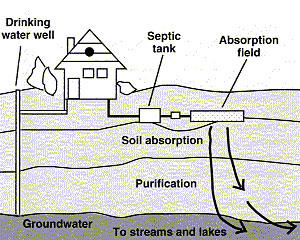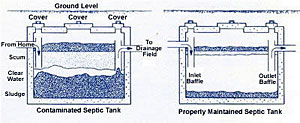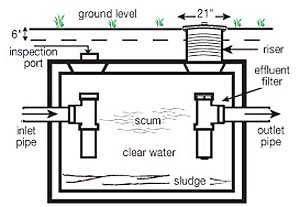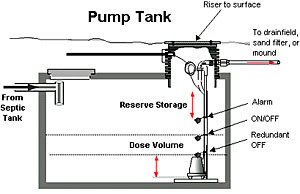FAQs
A septic system is an onsite, sub-surface, wastewater treatment plant that processes and filters all household wastewater (effluent) produced from toilets, sinks, laundry and showers. Typically, there are three sections; a treatment tank, a distribution system and an absorption area. In general, all wastewater is mixed together as it leaves the home. Sometimes, however, the household wastewater is divided into two types, Blackwater (toilet water) and Graywater (soapy water), and it may discharge into separate disposal systems.
 A septic tank is where primary treatment occurs (settlement and separation of sewage). All wastewater leaves the home and enters the septic tank through the inlet baffle. Sewage solids settle to the bottom of the tank and dirty water (effluent) leaves through the outlet baffle and moves out to the distribution box (D-box), when present. The D-box distributes the effluent to all laterals in the absorption field, where it passes through layers of gravel and select fill (sand), to be filtered before draining back down into the groundwater.
A septic tank is where primary treatment occurs (settlement and separation of sewage). All wastewater leaves the home and enters the septic tank through the inlet baffle. Sewage solids settle to the bottom of the tank and dirty water (effluent) leaves through the outlet baffle and moves out to the distribution box (D-box), when present. The D-box distributes the effluent to all laterals in the absorption field, where it passes through layers of gravel and select fill (sand), to be filtered before draining back down into the groundwater.
Small particulates (resulting from the breakdown of sewage) continually flow out of the tank as part of the septic effluent and can form deposits of sludge in various components. This can lead to blockage and premature failure. Installing an effluent filter in the outlet baffle of the septic tank will keep sewage materials in the tank, extending the life of the system. Filters must be routinely serviced / cleaned to properly protect the liquid disposal components.
Over years of operation, accumulated solids begin taking up too much room in the tank, reducing the volume available for settling. When this happens, solids easily escape the tank and can clog the disposal field and eventually cause a hydraulic back-up into the house or an overflow onto the ground surface. This can all be avoided if regular pump outs (every 1-3 years), effluent filter maintenance and periodic inspections are performed.
 It is recommended that you pump out your Septic Tank every 3 years (for a family of 4). If you have a Pump Tank, you may want to consider pumping it out every 6 years. This will keep it clear of sludge, which would hinder the functioning of your pump and clog the absorption area.
It is recommended that you pump out your Septic Tank every 3 years (for a family of 4). If you have a Pump Tank, you may want to consider pumping it out every 6 years. This will keep it clear of sludge, which would hinder the functioning of your pump and clog the absorption area.
Inspections are critical, if your goal is to extend the life of your septic system. Periodic inspections will provide you with information such as: Is the wastewater from the house running properly into the tank?, Does the tank have too much sludge build-up?, Is too much scum and sludge floating out to the disposal field?, Are the tank’s baffles in good shape?, is the soil under the disposal field still absorbing all the water from the tank?….and the list goes on. These inspections can uncover any problems and steps can be taken to correct them before they get out of hand.
Hiring a professional septic system management company to periodically evaluate individual components and the system’s over-all operation is a wise way to protect your investment (septic system and overall property).
- Inspections are regularly conducted for property transfers and many mortgage companies require a comprehensive septic system evaluation, prior to releasing funds.
- Montgomery Township requires homeowners who have either a new system or who have had repairs or alterations to obtain a license from the township that requires you to pump-out your tank every three (3) years. Ordinance BH:13-5b.
- Most Townships will allow repairs to the septic tank and distribution box, but once any type of malfunction occurs in the disposal field you must replace your entire system and update it to current standards.
- Readington Township requires all septic systems with a pump to be inspected once every three (3) years by a certified inspector.
 NO. All new septic tanks are required to have an effluent filter in the outlet baffle, as of April 2, 2012. Homeowners with a new septic system should get onto a maintenance program to clean the filter, monitor the system and periodically pump the septic tank (helping to extend the life of the system).
NO. All new septic tanks are required to have an effluent filter in the outlet baffle, as of April 2, 2012. Homeowners with a new septic system should get onto a maintenance program to clean the filter, monitor the system and periodically pump the septic tank (helping to extend the life of the system).
 NO. Your alarm is alerting you to a problem in your Pump Tank and has nothing to do with your septic tank. A Septic System Professional should be called immediately to diagnose and fix the problem and to avoid overflowing of the pump tank or septic effluent backing up into the home.
NO. Your alarm is alerting you to a problem in your Pump Tank and has nothing to do with your septic tank. A Septic System Professional should be called immediately to diagnose and fix the problem and to avoid overflowing of the pump tank or septic effluent backing up into the home.
In general, the average life expectancy is 20 – 25 years, but the longevity of your system depends on many factors. Soil conditions and maintenance play major roles. Reading this guide is your first step to extending the life of your septic system.
